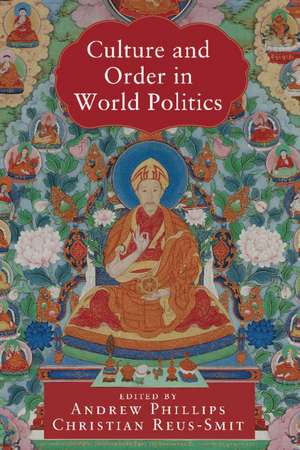Culture and Order in World Politics: LSE International Studies
Editat de Andrew Phillips, Christian Reus-Smiten Limba Engleză Paperback – 8 ian 2020
| Toate formatele și edițiile | Preț | Express |
|---|---|---|
| Paperback (1) | 322.29 lei 6-8 săpt. | |
| Cambridge University Press – 8 ian 2020 | 322.29 lei 6-8 săpt. | |
| Hardback (1) | 622.59 lei 6-8 săpt. | |
| Cambridge University Press – 8 ian 2020 | 622.59 lei 6-8 săpt. |
Preț: 322.29 lei
Nou
Puncte Express: 483
Preț estimativ în valută:
61.67€ • 64.52$ • 51.23£
61.67€ • 64.52$ • 51.23£
Carte tipărită la comandă
Livrare economică 02-16 aprilie
Preluare comenzi: 021 569.72.76
Specificații
ISBN-13: 9781108718936
ISBN-10: 1108718930
Pagini: 440
Dimensiuni: 153 x 230 x 25 mm
Greutate: 0.53 kg
Editura: Cambridge University Press
Colecția Cambridge University Press
Seria LSE International Studies
Locul publicării:Cambridge, United Kingdom
ISBN-10: 1108718930
Pagini: 440
Dimensiuni: 153 x 230 x 25 mm
Greutate: 0.53 kg
Editura: Cambridge University Press
Colecția Cambridge University Press
Seria LSE International Studies
Locul publicării:Cambridge, United Kingdom
Cuprins
Part I. Introduction: 1. Introduction Andrew Phillips and Christian Reus-Smit; 2. Culture and order in world politics Andrew Phillip and Christian Reus-Smit; Part II. Historical Orders: 3. The Ottomans and diversity Ayse Zarakol; 4. Qing and twentieth century Chinese diversity regimes James Millward; 5. Cultural diversity and coercive homogenization in Chinese history Victoria Tin-bor Hui; Part III. The Modern 'Liberal' Order: 6. Cultural diversity with global international society Andrew Hurrell; 7. Liberal internationalism and cultural diversity G. John Ikenberry; 8. When liberal states bite back: the micro-politics of culture Ellen Berrey; 9. Global institutional imaginaries Ann Swidler; Part IV. Constitution and Contestation: 10. Universal and European: cultural diversity in international law Arnulf Becker-Lorca; 11. The Jewish problem in international society Michael Barnett; 12. Recognizing diversity: establishing religious difference in Pakistan and Israel Maria Birnbaum; 13. Gender, nation, and the generation of cultural difference across 'the West' Ann Towns; 14. Governing culture 'credibly': contestation in the world heritage regime Elif Kalaycioglu; 15. Conclusion Andrew Phillips and Christian Reus-Smit; References; Index.
Recenzii
'The second volume of a trilogy, this brilliantly conceived and executed book draws on multiple disciplines (sociology, law, history, and political theory) to develop its central argument. Cultural diversity is patterned by diversity regimes (Ottoman, Chinese, Westphalian) and traceable in a large number of variegated domains (such as religion, gender, law, and global cultural heritage). The compelling results are a wake-up call for much IR scholarship. Culture nap time is over.' Peter J. Katzenstein, Walter S. Carpenter, Jr. Professor of International Studies, Cornell University, New York
'This volume pulls off a seemingly impossible task: to illuminate the role of culture in international orders without treating 'culture' as static, homogenous and bounded. Once and for all we can see beyond the clash of civilizations to better apprehend how cultural diversity matters for world politics.' Julian Go, Boston University, and author of Patterns of Empire
'Culture and Order in World Politics is a path-breaking collection that sets out a novel and interdisciplinary approach for systematically studying culture, and its impact, in global politics. Challenging the past tendency in IR to subscribe to either simplistic or outdated conceptions of culture, the contributors draw on insights from anthropology, sociology, history and cultural studies to demonstrate how different international orders over time have been shaped by cultural difference. The book's historical breadth, which places the much discussed 'liberal international order' in perspective, along with its theoretically-rich treatment of cultural diversity, will make it essential reading for those seeking to grapple with the enduring reality of cultural diversity and its relationship to international order.' Jennifer Welsh, European University Institute, Italy
'… Phillips and Reus-Smit (both, international relations, Univ. of Queensland, Australia) offer a pathbreaking collection on international relations. Written by outstanding international relations scholars … This is an absolutely required addition to the literature on international relations.' S. R. Silverburg, Choice
'This volume pulls off a seemingly impossible task: to illuminate the role of culture in international orders without treating 'culture' as static, homogenous and bounded. Once and for all we can see beyond the clash of civilizations to better apprehend how cultural diversity matters for world politics.' Julian Go, Boston University, and author of Patterns of Empire
'Culture and Order in World Politics is a path-breaking collection that sets out a novel and interdisciplinary approach for systematically studying culture, and its impact, in global politics. Challenging the past tendency in IR to subscribe to either simplistic or outdated conceptions of culture, the contributors draw on insights from anthropology, sociology, history and cultural studies to demonstrate how different international orders over time have been shaped by cultural difference. The book's historical breadth, which places the much discussed 'liberal international order' in perspective, along with its theoretically-rich treatment of cultural diversity, will make it essential reading for those seeking to grapple with the enduring reality of cultural diversity and its relationship to international order.' Jennifer Welsh, European University Institute, Italy
'… Phillips and Reus-Smit (both, international relations, Univ. of Queensland, Australia) offer a pathbreaking collection on international relations. Written by outstanding international relations scholars … This is an absolutely required addition to the literature on international relations.' S. R. Silverburg, Choice
Descriere
Provides a new framework for reconceptualizing the historical and contemporary relationship between cultural diversity, political authority, and international order.











